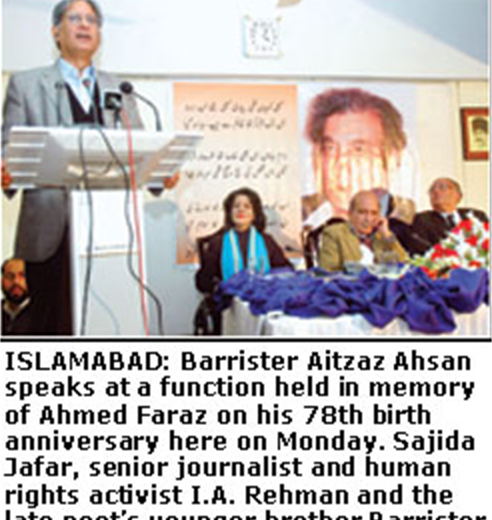Ahmad Faraz (1913-2008)
(Created page with "{| class="wikitable" |- |colspan="0"|<div style="font-size:100%"> This is a collection of articles archived for the excellence of their content.<br/>You can help by converting...") |
Latest revision as of 10:48, 16 November 2013
This is a collection of articles archived for the excellence of their content. Readers will be able to edit existing articles and post new articles directly |
[edit] Ahmad Faraz (1913-2008)
Faraz continues to encourage the dispossessed
ISLAMABAD, Jan 12: Ahmad Faraz continues to live in people’s memory, which was a tribute to his greatness as a poet. The latest edition of the well-known Urdu literary magazine Mah-i-Nau is devoted to studies on his life, work and art.
The Information Ministry’s Films and Publications Department, which has been bringing it out for the last half century or more, launched the exclusive edition on Monday to celebrate Ahmad Faraz’s (1913-2008) contribution to both resistance literature and romantic lyricism on his 78th [ ??]birthday.
“Poets of distinction are always present among us to guide us and it ill befits any person to suggest that Faraz had passed away”, said Sajida Jafar, Director-general of the Department.
Senior journalist and noted human rights activist, I.A. Rahman, speaking as the chief guest, said that Faraz continued to encourage the dispossessed humanity not to succumb to fear because the dark night was bound to end. He said that Faraz’s work was universal, as it had no religious and ethnic overtones. Its profound message concerned the common people and their lot in an unjust society.
Mr Rehman said Faraz believed in democracy and social justice like Faiz and Habib Jalib and had equal recognition in the hearts of young generation due to his romantic ballads.
Barrister Aitzaz Ahsan paid tributes to the poet for supporting the lawyers’ movement and condemning those who were opposing the independence of judiciary. “I feel proud to say that Faraz participated in the lawyers’ long march despite illness. It really encouraged and inspired us in our struggle for restoration of democracy”, he added.
His support was a signal that those who opposed the lawyers were wrong and could not be trusted as politicians.
He quoted a verse from a poem dedicated to Zulfikar Ali Bhutto, which said that those who carve wooden cross ultimately end up on the crucifix, as well as the lines: zabt laazim hai magar dukh ha qiamat ka Faraz/zaalim aab bhi na roya gar to mar jaye ga.
Aitzaz said he remembered these lines when he reached Naudero after the assassination of Benazir Bhutto. Faraz went to jail and suffered tortures for the supremacy of the Constitution but never bowed before any dictator.
Barrister Masud Kausar said his brother Faraz inherited the love of poetry from his father whom the late Z.A. Bokhari had asked to permit him to take the young poet to Karachi for grooming his talent. But, Faraz rose to heights of fame without anybody’s help.
In Barrister Kausar’s estimate, Faraz’s journey for eternal liberty of mankind was reflected in his two poems Lakhtai and Bano ke Naam.
He said Faraz was inspired from their father who was also a polyglot poet and composed verses in Pashto, Persian and Urdu.
Poet Shabnam Shakeel said that Faraz’s lyricism and his love poetry also deserved to be mentioned as it constituted the main body of his work. She then recited a poem depicting the magic of his love poetry. Poet Hasan Raza also read a touching poem in tribute. Dr Ayesha Siddiqa and Mansha Yad also paid tributes to Faraz.
A number of poet’s admirers and friends, including Faraz’s sons were also present at this largely attended function.
The 410-page issue is a collectors’ item, containing scores of coloured pictures, including reprinting of about half a dozen sketches by artist Abro and taken from Dawn’s ‘Books and Authors’ section. It includes a hundred plus ghazals sent for publication by Faraz’s admirers.
According to Sajida Jafar, the DFP had launched a poetry competition on Faraz, which was then edited by poet Parto Rohilla.
However, many people attending Faraz’s commemoration meeting thought it was PPP government’s official acknowledgement of Faraz’s poetical eminence as well as his station among celebrated writers’ of Urdu literature in contemporary times.
The DFP’s function was a sequel to the publication of a special issue of Pakistan Academy of Letters bi-annual journal, Adbiyat, devoted to Faraz.
One remembers that a few years ago, Faraz used to be the Managing Director of National Book Foundation (NBF), until he was relieved of his post as punishment for denouncing those in authority for usurping human rights.
The writers’ community is now waiting for the NBF to issue an exclusive edition of its quarterly journal Kitab.
In a separate function held at the residence of Faraz’s friend Mansur Javed, writers and friends paid tribute to the great poet. “We celebrate Faraz’s birth day every year and we thought we should do this year also”, remarked Mansur Javed.
Those who attended the function were: Shabnam Shakeel, Sarwat Mohyuddin, Naushi Gilani, Faraz’s wife Rehana, sons Saadi and Shibli, Prof Fateh Mohammad Malik, Agha Nasir, Haleem Qureshi, Mahbub Zafar, Naveed Zaidi, Hasan Sardar, Sarmad Sehbai, and Syed Khan.
In the morning, they visited the Islamabad graveyard at H-8 to lay floral wreath on Faraz’s grave.
—Jonaid Iqbal
